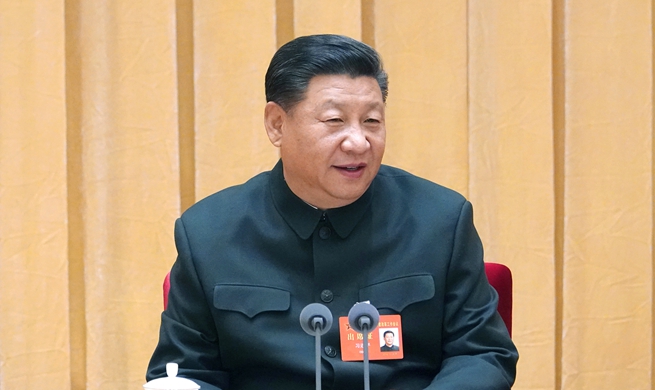LONDON, Nov. 14 (Xinhua) -- Britain's inflation remained above the central bank's target level in data released on Wednesday, but the Bank of England (BoE) remains unable to make a timely response while uncertainty hangs over the Brexit process.
The consumer price index (CPI) remained stable month on month in October at 2.4 percent, above the BoE's target of 2 percent, according to data from the Office of National Statistics (ONS).
Major components of the inflation figure pulled in different directions, with food pulling downwards while energy pushed upwards.
Goods inflation eased below 1.0 percent annual increase for the first time since February 2017, driven mainly by cars, clothing and footwear prices, indicating that the inflationary pressure of sterling's sudden and massive depreciation at the time of the Brexit referendum in June 2016 has now largely passed through the figures.
Food inflation fell back to a 20-month low of 1.8 percent annualized, but energy inflation continued its rise, reached double digits for the first time since early 2012, with auto fuel prices rising steeply at 0.7 percent up month on month.
Increases in gas and electricity tariffs also pushed inflation higher.
This represents the 21st consecutive month at which inflation has been higher than the bank's own primary monetary target.
The BoE has raised the bank rate just once in that time, by 25 basis points to 0.75 points but has been hampered from a more robust response by the uncertainties around Brexit.
Official jobs data released on Tuesday further confirmed the central bank's expectation that a record number of jobs in the economy, and a jobless rate at 4.1 percent (a level not seen for 43 years) indicate that much of the surplus in the economy has been used up.
The jobs figures also revealed a growing unwillingness among foreign workers to commit to staying in Britain against the backdrop of Brexit uncertainty, with a record number of EU nationals leaving the country, further diminishing the pool of workers.
However, pressure on the BoE to raise the bank rate will ease in the coming months, according to Howard Archer, chief economic adviser to EY ITEM Club, a financial data firm.
"CPI inflation surprised on the downside. We expect inflation to remain just above the 2 percent target for the remainder of this year, but it is likely to drop back as we move into 2019."
Archer told Xinhua: "Core pressures remain soft and some powerful downward base effects will come into play, while the recent drop in the oil price should start to feed through to prices at the pump."
Archer said the 2.4 percent October inflation figure was a little below the Bank of England's projection of 2.5 percent.
He said: "In itself this does not mean a lot, but we expect such downside surprises to become a pattern as we move through 2019. This is likely to encourage the MPC to take a very gradual approach to tightening monetary policy." Enditem

















